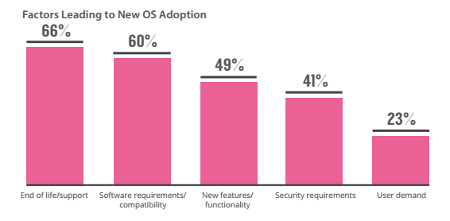Upgrading to a new operating system is a challenge that many businesses face, especially in light of several prominent older systems reaching their end-of-support date in recent times. For example, Windows XP reached its end of support date just a few years ago, and this past January, Microsoft pulled the plug on Windows 8. While unsupported software is certainly a problem, why does a business ultimately choose to upgrade away from their current OS?
According to a study by Spiceworks, there are several reasons a business wants to start using a new operating system on their workstations:
- Most businesses will only start to use more recent operating systems as needed (69 percent).
- Others will upgrade because they want to take full advantage of new apps that are supported by the new OS (42 percent).
- Some will even try to use a new OS due to their hardware coming with the software pre-installed (38 percent).
However, there are other reasons that a business might decide to adopt a new OS, and most of them are issues that are addressed by upgrading to a more recent OS. Here’s a chart from Spiceworks’ report:
It’s no surprise that the biggest culprit for convincing businesses to upgrade their systems is end-of-life events, at a solid 66 percent. Without the required security updates and patches, using older operating systems that Microsoft no longer supports can quickly become a liability and security threat. There’s no reason to be using an operating system that places your entire infrastructure at risk, and the resulting data breaches could put the future of your business in jeopardy.
Similarly, your business can’t jump the gun and upgrade away from an OS that supports your business’s mission-critical applications and software solutions. Doing so could result in an inability to continue operations as normal, and the resulting downtime could have your business moving forward with a crutch. At the same time, however, you might need the latest operating systems to fully leverage new features provided by them. This added functionality might seem like a great reason to upgrade your business’s technology, but only if you take proper precautions before doing so.
Furthermore, one of the best reasons a business will move to a more recent OS is to reap the benefits of a more secure computing environment. In addition to receiving critical security updates from Microsoft, some more recent operating systems have enhanced security features. Windows 10, Microsoft’s most recent addition to the Windows family, is a great example of this.
As you can see, there’s a lot to consider before your business can upgrade to a new operating system. Will it affect your team’s ability to perform their daily duties? Will it shore up your business’s data security? These are things that you’ll only know if you perform a quality network assessment. Doing so can prevent any headaches that you might experience during the upgrade process.
Contacting MTG for a network assessment is a great way to understand your business’s current cybersecurity state, as well as to understand the weaknesses in your network that inevitably need to be shored up. To learn more, give us a call at (215) 247-8324.


